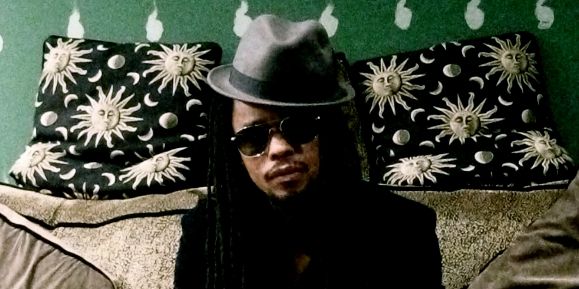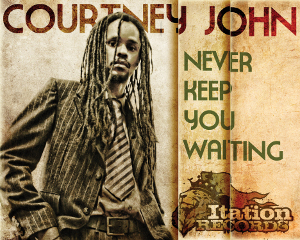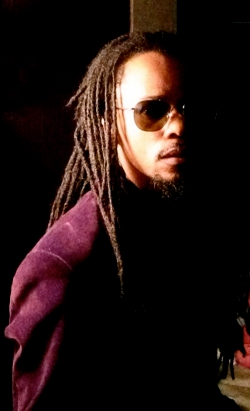Articles about reggae music, reviews, interviews, reports and more...
Interview: Courtney John, A Retro-Modern Balancing Act
- Home
- Articles
- Interviews
- Interview: Courtney John, A Retro-Modern Balancing Act

Interview: Courtney John, A Retro-Modern Balancing Act
"Sometimes people abuse the privilege of how powerful reggae is"
Sampler
When Angus Taylor interviewed lovers rock reggae singer Courtney John for United Reggae in April 2010 he was riding on the success of his album 'Made In Jamaica' and the Peckings-produced hit single Lucky Man. Since then interest in Courtney John has only increased. The singer and producer formerly known as Yogi whose uncles Boya and Beres Hammond introduced him to the music business now has a solid international following. One of those global links is with California’s Itation Records who are promoting Courtney John’s new single Never Keep You Waiting, which features sparkling music arrangement by the Tune In Crew. With both a love of Jamaica’s rocksteady sounds and modern international music of all sorts, Courtney John balances a career based on quality over quantity. He spoke to United Reggae about his recent recordings and how to be a successful artist in 2011.

Your new song Never Keep You Waiting on Itation Records will be released on Valentines Day. How did that session come together?
Well, Facebook gets the credit (laughs)! One morning I was online and saw Itation [Records] pop up (in chat) and he says he has a project he wants me to be involved with. So I said ‘Alright, send through the riddim’. It didn’t take long for me to come up with something on it. Normally the riddim dictates what I’m going to sing or write. I don’t set any boundaries as to what I’m going to sing, and that song just came out. I have a studio in Jamaica so I recorded the vocals here
What’s the song’s message, what were you feeling when you were recording it?
Most of my songs are about man-woman relationships because, you know, that’s just my thing. This particular song is about a man and a woman and the woman is not too sure where she is in the relationship. The man is just trying to reassure her that he’s not gonna keep her waiting. Because a woman can get worried after the relationship goes on for a while and there’s no marriage and maybe she’s getting pressure from her family… So this tune is saying, that’s not gonna happen, the guy is never going to keep you waiting, and telling her all the great things she means to him.  It’s like, even though at times a man is out there hunting and gets distracted, he still knows that she means everything to him.
It’s like, even though at times a man is out there hunting and gets distracted, he still knows that she means everything to him.
Did you know it was going to be Valentine’s Day release?
[Itation] told me they wanted something geared toward the ladies. Normally though certain instrumentation and sound [on the track] will draw those things out. The music really determines if I’ll do a song that’s socially conscious or about man-woman relationships or something else.
You also have a great song on the new Strictly The Best Vol. 42 compilation called "Love Is" based on the Treasure Isle hit "You Don't Need Me" by The Melodians. When did you record that track?
Lloyd Campbell from the Joe Fraser label produced that one. He contacted me and said he had this track and that my vocals would make magic with it. I recorded the song late early summer last year at my place in Kingston. That tune is doing great right now, it’s number on a few charts and is one of those songs that keeps building and building. Lloyd Campbell definitely has to get big up on that one!
The good thing about what we’re doing now with the retro-tracks, is reminding people where the music was back in those days. It meant something; it was special. Sometimes people abuse the privilege of how powerful reggae is. So we wanted to remind them that there are still people who respect the artists who came before. The Melodians did the original track [that “Love Is”] is based on. A lot of young people who are Courtney John fans now will research where that track came from. It might be the first time they’ve heard the Melodians or the Supersonics, who were the session band for Treasure Isle. Then they learn that Duke Reid was Coxsonne Dodd’s biggest competitor. So you put a fresh face to it and try and keep it memorable. But all the other genres of music do it too. For instance, even now you have rock bands trying to sound like the Beatles or the Rolling Stones.
 I’m big fan of sad love songs!
I’m big fan of sad love songs!
Your voice definitely reminds me of great Jamaican singers like B.B. Seaton from The Gaylads and Pat Kelly or Slim Smith from The Techniques and of course I hear the Curtis Mayfield and Marvin Gaye influence too. What were you listening to as a youth and how did you come to appreciate the old time sounds?
My uncles were both professional musicians – Beres and Boya Hammond. Boya is the one that got Beres into the music business and he got me into it as well. Back then, because of our economic status, we didn’t have TV and them thing so the radio was the highlight of the house. We had two radio stations – JBC and RJR. We got music feeds from the BBC – rock ‘n’ roll and them kinda vibes, and then we have reggae and Motown -- Jackson 5 and Supremes and all of that was important. I grew up listening to a very eclectic batch of music. But I am sucker for the classic rocksteady era – Alton Ellis, The Paragons, The Melodians – I’m big fan of sad love songs! Those artists to me are the icons because they delivered that soul that lives on. Like when you go to a Rae Town dance [in Kingston] on a Sunday and it’s almost like you’re instantly reminded of that period. I grew up on the classics listening to the radio. But I’m still a fan of what goes on today too because I have to represent this generation.
When did you learn that Jamaican music was a truly international phenomenon?
I really have to give credit to Bob Marley and Bunny Wailer. I remember in 1986 I was watching a concert with Bunny Wailer playing by himself in Madison Square Garden! And I’m like, woah! That thing was powerful. From there I realized that reggae was impactful. In terms of media coverage [of Jamaican music], we have to give Bob [Marley] and the Wailers the credit.
What have you taken away from your experiences touring outside of Jamaica?
It reminds me of how special that our music and culture is and some times it’s very humbling. The music [business] can expose you to a lot of things – I’ve met presidents of countries and billionaires of companies and for me it’s like, I’m just a lickle youth form the country who sings some songs and that allows me to be in the company of these kind of people. But [also] you can be a part of things that can change people’s lives. That to me is the biggest draw of this whole thing. Obviously, to be able to take care of your family is an added plus.
 You can be a part of things that can change people’s lives. That to me is the biggest draw of this whole thing
You can be a part of things that can change people’s lives. That to me is the biggest draw of this whole thing
Do you think we're coming out of a DJ phase in Jamaican music and back towards singers?
 No, the DJs will always be there, whether its Yellowman, Brigadier Jerry or U-Roy or Movado. We have to start embracing it. We are Jamaicans, and Jamaicans are capable of doing lot of things. The next big hip-hop star might come off the Rock, you know? But I think now people are moving to a different vibration, they might want to hear singers a lot more because sometimes singer can be a lot more comforting in times of [economic] recession. But when money start run again and people start live good then it’ll go back to DJ you know? Music speak to what people are going through and everything goes around in cycles. I grew up listening to a lot of DJs. I used to sneak out and go see Supercat, Silverhawk (Sound System), General Trees, Sasafrass and Charlie Chaplin and it spoke to me at that age. The youths are always going to find the cutting edge thing.
No, the DJs will always be there, whether its Yellowman, Brigadier Jerry or U-Roy or Movado. We have to start embracing it. We are Jamaicans, and Jamaicans are capable of doing lot of things. The next big hip-hop star might come off the Rock, you know? But I think now people are moving to a different vibration, they might want to hear singers a lot more because sometimes singer can be a lot more comforting in times of [economic] recession. But when money start run again and people start live good then it’ll go back to DJ you know? Music speak to what people are going through and everything goes around in cycles. I grew up listening to a lot of DJs. I used to sneak out and go see Supercat, Silverhawk (Sound System), General Trees, Sasafrass and Charlie Chaplin and it spoke to me at that age. The youths are always going to find the cutting edge thing.
Outside of Jamaican music, what other styles of music do you listen and are styles we might not expect you to like?
I listen to anything that sounds good. Right now I’m listening to a lot of modern jazz instrumental music fused with hip-hop. I’m getting ready now to start another album so I’m trying to draw inspiration from all the different genres. I’m the type of artist that listens to everything, I have no biases toward good music – it could be country, rock, whatever. Obviously Jamaica is the root, the foundation, and I don’t forget about that. It’s easy in Jamaica because [the music] that we package and sell is something great and I get that sound every day. But I do explore music all the time; I’ll go on the internet and listen to some music from India, some African music or Brazilian music – keep the brain fresh and up-to-date with a different vibe that’s going on around the world.
 Every genre of music has to evolve for the next generation. The next generation has to feel as though it’s their music
Every genre of music has to evolve for the next generation. The next generation has to feel as though it’s their music
In your opinion, what does it take to be a successful artist in 2011?
Gone are the days when you could just sit at home and be an artist. Now you need a team to be successful. The people that you have and how they guide you governs the business that you do. To try and balance the music business and artistic headspace can be tedious for an artist. But the business side of music is so important now. [An artist needs] the right people who can make sure that your vision resonates with as many people as possible because ultimately [reaching fans] is the success of an artist. Not in terms of monetary expectations -- most times that’s just the by-product. Fortunately or unfortunately the money ‘a come in a it to where people make a lot of money off the success of their music and they become miserable! (laughs) Money doesn’t make a difference!
I noticed you're up with all of today's technology -- Facebook, Twitter. As an artist what's your opinion on these tools?
It’s a sign of the times. But ultimately I don’t think it does much because in this day and age when we can reach out so easily to people, we’re still seeing music sales go down and artists are playing to less people in the venues. In retrospect it seems that when we nah ‘ave these technologies the music used to have a bigger profile. But for an independent artist like myself I do embrace the technologies but there’s only so much I do with them because I feel that still it’s the songs that are reaching people.
Jamaicans in general have really embraced new technology, right?
I was reading a report the other day that said Jamaica has the most BlackBerries per capita than any other part of the world!
Read more about this topic
Comments actually desactivated due to too much spams
Browse by categories
Recommended Articles
Latest articles
Recently addedView all
© 2007-2026 United Reggae. All Rights Reserved. Reproduction in whole or in part is prohibited. Read about copyright
Terms of use | About us | Contact us | Authors | Newsletter | A-Z














